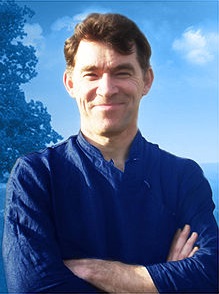Guest writer for Wake Up World
The idea of a “soul” runs through our language and culture. We talk about soulmates, soul-searching, and those who have a “good soul.” In these contexts, the soul refers to the essence of a person, a deep aspect of our identity beneath our surface personality.
The word soul derives from the Old Hugh German seula, which was a translation by early Christian missionaries of the Greek word psyche. The ancient Greeks believed that the psyche was the source of life and consciousness. It was distinct from the body and thought to be immortal.
Most religions throughout history have held a similar view, that the soul is of a different nature to the body, inhabiting it like a genie in a bottle. Until the 19th century, almost every culture in human history took for granted that the essence of human identity was non-physical and would survive the death of the body.
Many religions envisage the afterlife as a paradise where the soul attains the fulfilment and happiness that eludes us during our physical lives. This may partly explain why the concept of the soul developed, or at least became prevalent.
Physicalism: A Modern Worldview
From a modern perspective, these notions of the soul or an afterlife may seem naive. Surely, we now know that there is no such thing as the soul or spirit, that human beings are mere meat machines—and that human identity or consciousness is just produced by neurological activity? Of course, this also means that there cannot be an afterlife, since human consciousness cannot outlive the brain that produces it.
Philosophically speaking, this modern worldview is known as materialism or physicalism—the belief that the universe is fundamentally physical, consisting of material particles and physical forces.1
According to physicalism, although it may seem that we have some non-physical experiences, such as thoughts and feelings, these can be explained in physical terms. Thoughts may simply be the result of electrical signals produced by neurotransmitters. Feelings such as hope, love, and sadness may simply be due to neurological activity.2
The Problem of Consciousness
However, even if some pre-modern concepts of the soul were naive, there are serious problems with physicalism too. Physicalism cannot fully account for human experience, or fully explain the world we live in.3
For example, despite decades of rigorous research, no one has any clear notion of which brain processes might be involved in consciousness. There are also many strange mismatches between brain activity and conscious experience, including cases of minimal brain activity—such as when people are in comas—where consciousness not only continues but sometimes becomes more intense than normal.
Another anomaly is the phenomenon of terminal lucidity when dying people who suffer from severe psychiatric or neurological disorders—perhaps due to dementia, a stroke, or meningitis—suddenly appear to regain full awareness, becoming lucid and alert.
One of the most striking anomalies is near-death experiences, when people with no signs of neurological or physiological activity later report powerful conscious experiences, even claiming to recall events they have heard or seen while apparently unconscious.
There have been numerous attempts to explain near-death experiences. One possible idea is that in these states there may be an extremely low level of continuing neurological activity, which is not picked up. However, this would still leave the problem of how extremely minimal brain activity could generate experiences that are more intense than normal consciousness.
With growing awareness of the difficulty of explaining consciousness in physical terms, more and more scientists and philosophers are considering alternative approaches. One viewpoint that has become more appealing to some philosophers—such as Susan Blackmore and Keith Frankish—is that consciousness may not actually exist, but is simply a cognitive illusion.
However, the above anomalous experiences point to another possibility: that consciousness cannot be explained in physical terms because it is essentially non-physical. It might not be wholly dependent on, or produced by, the brain—but could derive from a non-physical source.
Another Worldview
Perhaps we need to reintroduce the concept of the soul, in a more nuanced way. We should be open to the possibility that the world contains non-physical elements and is even fundamentally non-physical. It may be that consciousness is a universal and fundamental quality. It doesn’t just exist in humans or other living beings, it is everywhere and in everything. My variant of this approach, as I describe in my book Spiritual Science, is called panspiritism.4
It may be that the human brain does not actually produce consciousness but transmits it. Like a radio, the brain may “pick up” fundamental consciousness from the space around us and transmit it to us, so that we become individually conscious.
This could help to explain why we can sense each other’s feelings through empathy—because we share the same fundamental consciousness. It could also explain why consciousness can’t be precisely linked to neurological activity—because consciousness comes through the brain (rather than from it), from the space around us, and ultimately from the universe itself.
In this interpretation, the soul (or consciousness) is not independent of the body. It interacts with the brain and body, to produce our mental activity and individual identity.
According to this view, the soul isn’t simply a human phenomenon, as some Christians believe. If consciousness is fundamental, then in effect the whole universe has a soul. And all things within the universe—both living and non-living—are ensouled. Every individual soul derives from and is always part of the soul of the universe; just as a stream of water is always part of the fountain that it flows from.
References:
1. stanford.edu/entries/physicalism/
4. Taylor, S. (2018). Spiritual Science. Watkins.
Originally published at Psychology Today and reproduced with permission.
About the author:
Steve Taylor is a senior lecturer in Psychology at Leeds Beckett University, UK. His latest books in the US are The Calm Center and Back to Sanity: Healing the Madness of the Human Mind. He is also the author of The Fall, Waking From Sleep, and Out Of The Darkness. His books have been published in 19 languages. His research has appeared in The Journal of Transpersonal Psychology, The Journal of Consciousness Studies, The Transpersonal Psychology Review, The International Journal of Transpersonal Studies, as well as the popular media in the UK, including on BBC World TV, The Guardian, and The Independent.
Connect with Steve at StevenMTaylor.com.

If you've ever found value in our articles, we'd greatly appreciate your support by purchasing Mindful Meditation Techniques for Kids - A Practical Guide for Adults to Empower Kids with the Gift of Inner Peace and Resilience for Life.
In the spirit of mindfulness, we encourage you to choose the paperback version. Delve into its pages away from screen glare and notifications, allowing yourself to fully immerse in the transformative practices within. The physical book enriches the learning process and serves as a tangible commitment to mindfulness, easily shared among family and friends.
Over the past few years, Wake Up World has faced significant online censorship, impacting our financial ability to stay online. Instead of soliciting donations, we're exploring win-win solutions with our readers to remain financially viable. Moving into book publishing, we hope to secure ongoing funds to continue our mission. With over 8,500 articles published in the past 13 years, we are committed to keeping our content free and accessible to everyone, without resorting to a paywall.










